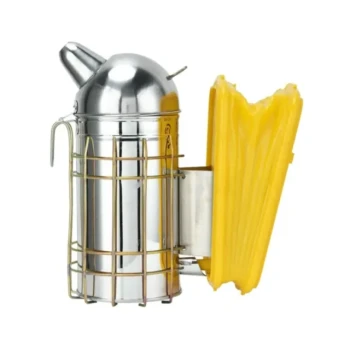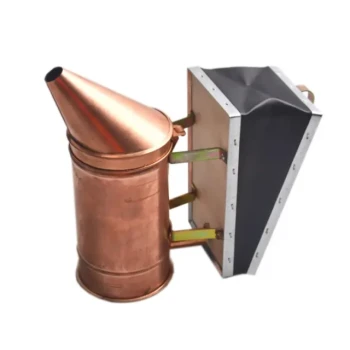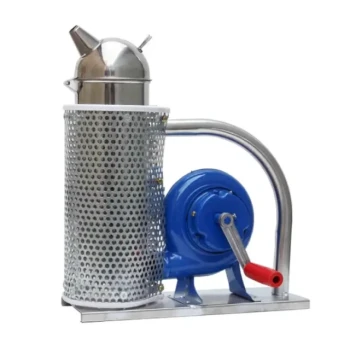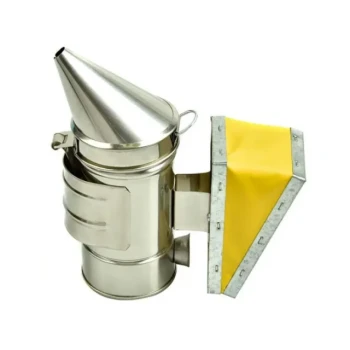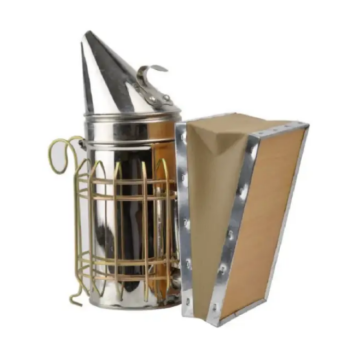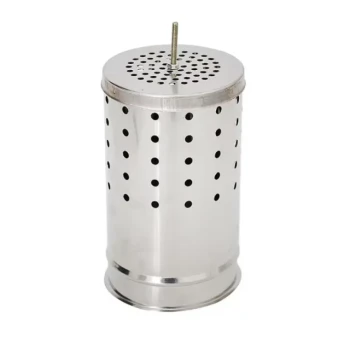At its core, a bee smoker is a tool for communication and misdirection. Its purpose is to calm a honeybee colony by disrupting its natural defensive responses, making hive inspections and manipulations significantly safer for both the beekeeper and the bees. It works by masking the chemical alarm signals bees use to coordinate an attack and by triggering an older, more powerful survival instinct.
A smoker does not sedate or tranquilize bees. Instead, it temporarily overrides their defensive behaviors by scrambling their alarm signals and activating a deep-seated instinct to gorge on honey in preparation for a potential hive evacuation.
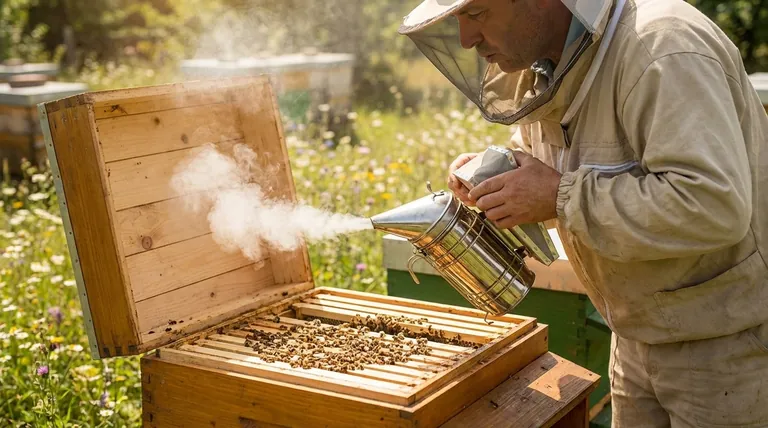
The Dual Mechanisms of Bee Calming
To use a smoker effectively, it's essential to understand the two primary ways it influences bee behavior. These effects work in tandem to create a more docile and manageable colony during an inspection.
Masking the Alarm Pheromone
Guard bees release an alarm pheromone when they perceive a threat. This chemical signal, which smells faintly of banana, alerts the rest of the colony to the danger and triggers a coordinated defensive response.
Smoke particles effectively "jam" this signal. The particles bind to the bees' antennae, which they use to "smell" the pheromone, overwhelming their senses. This prevents the alarm from spreading throughout the hive, stopping a full-scale defensive reaction before it can begin.
Triggering the Wildfire Instinct
Smoke also triggers a much more powerful, primal instinct: the threat of a wildfire. When bees detect smoke, their immediate priority shifts from defending the hive to preparing for a potential evacuation.
To prepare, the bees rush to the honeycomb and begin to gorge on honey, loading up on energy reserves in case they need to abandon their home. A bee with a full abdomen of honey is physically less able to flex its body to sting and is generally far more preoccupied and docile.
Common Scenarios for Smoker Use
While not always required for every hive visit, a smoker is an indispensable tool for managing the colony's stress during key moments.
Routine Hive Inspections
A few gentle puffs of cool, white smoke at the hive entrance and under the cover before you begin an inspection is a proactive measure. This sets a calm tone and prevents the guards from ever releasing the initial alarm pheromone.
Major Hive Manipulations
Activities that are highly disruptive require the consistent use of a smoker to maintain calm. This includes procedures like honey extraction, adding a new queen, or combining two separate colonies, all of which can be very stressful for the bees.
Responding to Agitation
If you open a hive and are met with a loud, agitated buzzing or bees bumping against your veil, a smoker is your primary tool for de-escalation. A few puffs can quickly disrupt the defensive behavior and calm the colony enough for you to proceed safely or close the hive if necessary.
Understanding the Trade-offs and Best Practices
Using a smoker is a skill. While it is a foundational tool in beekeeping, its misuse can be counterproductive or even harmful to the colony.
Over-smoking is Counterproductive
The goal is to use the minimum amount of smoke necessary. Excessive smoking can stress the bees, drive them off the frames you need to inspect, and potentially taint the honey with a smoky flavor. Use gentle, cool puffs, not thick, hot clouds.
A Smoker Is Not a Substitute for Good Technique
A smoker cannot compensate for rough or clumsy handling. Your primary tools for keeping bees calm are slow, deliberate movements and choosing the right time to work your hives, preferably on warm, sunny days when most foragers are out.
The Quality of Smoke Matters
Always use a fuel source that produces cool, white smoke. Good fuels include untreated burlap, pine needles, or cotton fabric. Hot, acrid smoke from inappropriate fuel will irritate the bees and can make them more aggressive, not less.
How to Apply This to Your Hive
Your approach to using a smoker should adapt to the specific task at hand and the temperament of the colony you are working with.
- If your primary focus is a routine inspection: Use a few gentle puffs at the entrance and under the cover to prevent alarm before it starts.
- If your primary focus is a major hive intervention (like harvesting or requeening): Use smoke more deliberately throughout the process to maintain a consistent state of calm during a lengthy and stressful procedure.
- If your primary focus is responding to an already agitated hive: Use targeted puffs directed between the frames to disrupt the defensive behavior and allow the bees (and yourself) to reset.
When used with skill and intention, a smoker transforms a potentially confrontational interaction into a managed and peaceful one.
Summary Table:
| Purpose | Key Mechanism | Effect on Bees |
|---|---|---|
| Calm the Colony | Masks Alarm Pheromone | Prevents coordinated defensive attack |
| Ensure Beekeeper Safety | Triggers 'Wildfire' Instinct | Bees gorge on honey, becoming docile and less likely to sting |
| Facilitate Hive Inspections | Disrupts Defensive Communication | Allows for safer, more manageable hive manipulations |
Ready to handle your hives with confidence and safety?
A reliable smoker is a cornerstone of effective beekeeping. At HONESTBEE, we supply commercial apiaries and beekeeping equipment distributors with high-quality, durable smokers and fuel designed for optimal performance. Our wholesale-focused operations ensure you get the professional-grade tools you need to keep your colonies calm and your operations running smoothly.
Contact HONESTBEE today to discuss your smoker and equipment needs and enhance your hive management practices.
Visual Guide
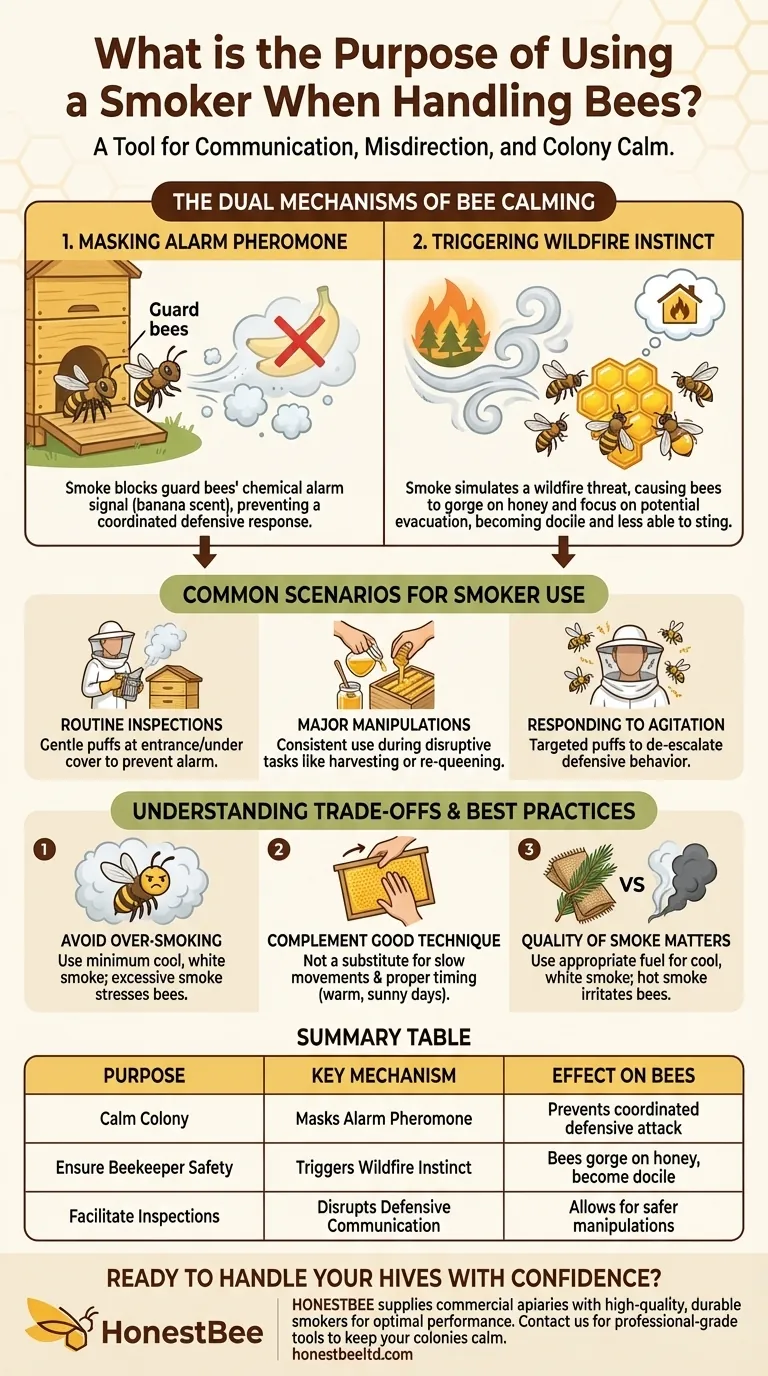
Related Products
- European Stainless Steel Bee Smoker for Honey Bee Hive
- Professional Bee Smoker with Elongated Spout and Durable Bellows for Beekeeping
- Heavy-Duty Bee Smoker with Durable Plastic Bellows for Beekeeping
- Premium Traditional Copper Bee Smoker with Bellows
- Electric Bee Smoker European Style Bee Hive Smoker for Beekeeping
People Also Ask
- Do bees hate the smell of smoke? The Truth About Beekeeping's Most Vital Tool
- What are bee smokers made out of? Choose the Right Material for Your Apiary
- Do bee smokers harm bees? The Truth About Safe Hive Management
- What do you smoke bees with? The Key to Calm, Safe Hive Inspections
- Can I use smoke to get rid of bees? Why Smoke is a Tool, Not a Solution


